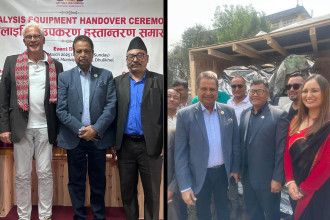
KATHMANDU: Federation of Nepalese Chambers of Commerce and Industry (FNCCI) has welcomed the government's pledge in the forthcoming fiscal year's budget to establish a commission for a new wave of reforms, aligning with FNCCI's request.
FNCCI on October 12, 2023, hosted an economic debate where, for the first time, it proposed the formation of a commission to implement a new phase of the economic reform programme for long-term development. FNCCI has been consistently advocating for this and hopes that the private sector will also participate in the commission, leading to a special plan for policy reforms and stability.
In addition, the government has addressed FNCCI's initiative to set up an investment company by pooling the savings of small business owners. This move is expected to aid in the revival of even dormant industries by encouraging small investors, especially when the investment climate is not conducive.
In response to FNCCI's call for an investment decade, the government has declared a decade of investment in agriculture. This includes fruit farming in the mountains and businesses focused on highways, among other things. However, as the budget provisions are insufficient to attract private sector investment in agriculture, further work is required.
FNCCI's request to develop Nepal as a special hub for weddings and gatherings in tourism promotion has been acknowledged in the budget. Similarly, the demand for government support to the private sector for the construction of a hill station near the Indian border has been met. FNCCI has said that the government should provide access roads, electricity, and water, including education, health, and tourism.
The budget for fiscal year 2024/25 has increased the funding for startups this time. It is anticipated that the work will proceed according to the startup policy initiated by FNCCI. More work is needed on project mortgage loans to startups. The initiative to build an IT hub is positive, but the budget has not addressed the growing frustration among the youth due to policy changes in the IT and startup sectors.
In the context of the continuous decline in the manufacturing industry's share of the GDP, the government has failed to boost morale with additional programmes in the budget. The government has not proposed concrete programmes to mitigate the impact of the country's graduation from a Least Developed Country (LDC).
It is commendable that the budget for the next fiscal year has prioritised economic reform and the promotion of the private sector. FNCCI had requested a special programme to promote the private sector for economic transformation, which has been prioritised. However, to implement this priority, the budget covers only a few topics, so more work is needed.
The budget mentions that the monetary policy will align with it. However, there are very few concrete programmes in the budget that private sector can utilise to absorb the excess liquidity in banks and financial institutions (BFIs). From this perspective, monetary policy can be expected to boost the morale of the private sector, but a solid foundation is necessary for this.
Members of FNCCI, district municipal chambers of commerce and industry, commodity associations, and associate members are suggesting changes to the tax rates through the Economic Bill and its impact on enterprise business. Past experience indicates that there will be complications during the implementation of the new tax rate, affecting the overall business environment.
In the absence of predictable policies, existing investment is in crisis and foreign investment has not been forthcoming. FNCCI has said the Ministry of Finance and related agencies will be prepared to mitigate the impact of policy changes.
The lack of political and policy stability, frequent changes in revenue rates, hostile behaviour towards investors, and other issues have discouraged the private sector, which holds 81% of the economy. Due to the lack of investment, the manufacturing and construction sector, which provides many jobs in the current fiscal year, is negative. The goal of economic growth set in the budget will only be achieved if the provisions in the budget that are friendly to the private sector are implemented and the monetary policy encourages investors.
FNCCI has hoped that there will be cooperation between the government and the private sector in implementing the private sector promotion programme mentioned in the budget's objectives and priorities.
READ ALSO:
- FNCCI hosts workshop to discuss impact of Nepal's graduation on exports, employment
- Private sector welcomes new budget, calls for effective implementation
- FNCCI suggests tax reduction, economic transformation
- Budget for FY2024/25 brought in a realistic manner: Finance Minister Pun
- Budget: Govt aims to transform country into IT hub
- Budget: Govt revises tax rates, prioritises domestic industries
- Finance Minister unveils annual budget of Rs 1.86tn for FY 2024/25





-1743399264.jpg)
